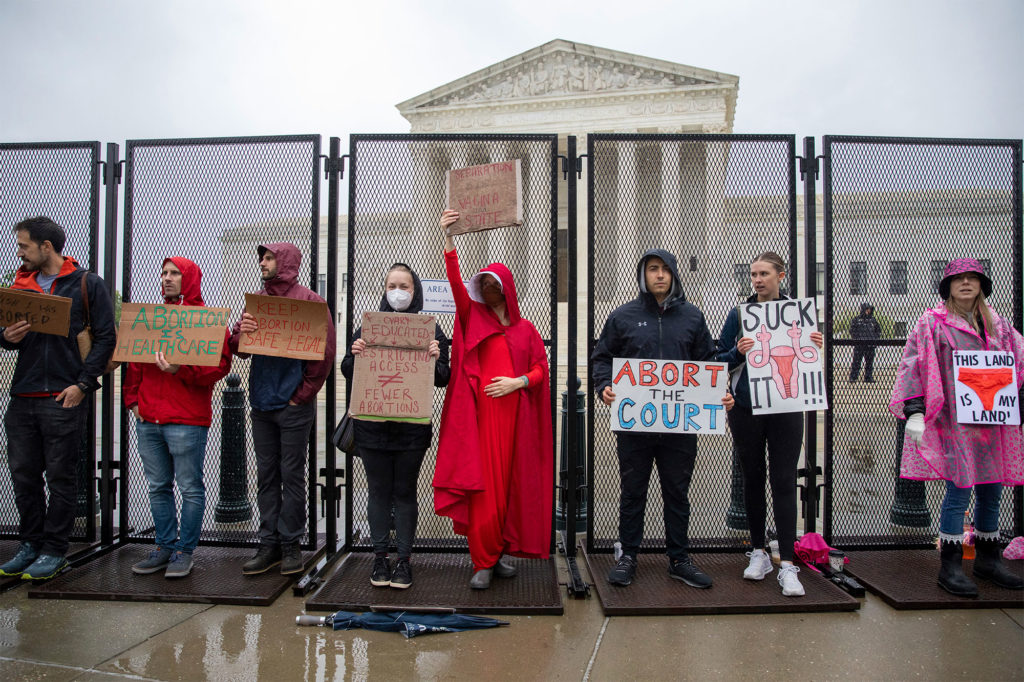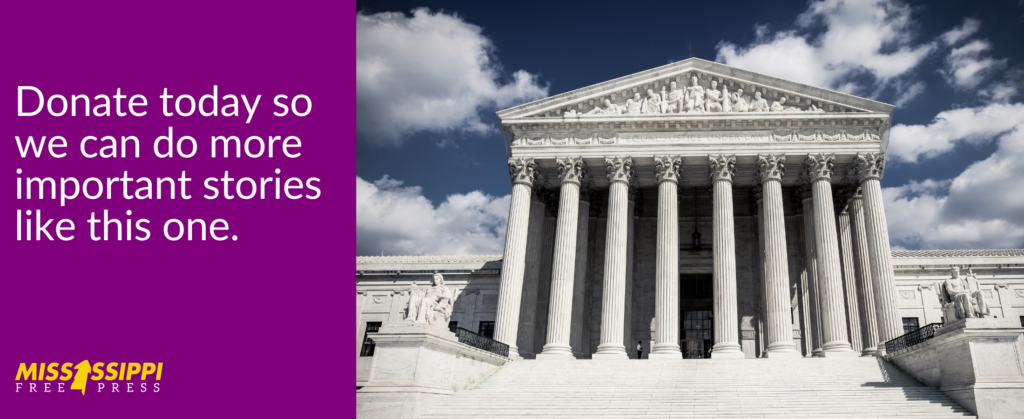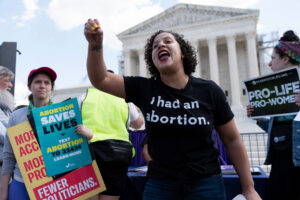The U.S. Supreme Court struck down Roe v. Wade this morning, paving the way for states like Mississippi to restrict abortion access to a greater extent than any time in the last half century. The ruling in Dobbs v. Jackson Women’s Health Organization immediately allows Mississippi’s ban on nearly all abortions after 15 weeks to go into effect.
The ban allows exceptions only in cases where a pregnant person’s life is endangered or in the event of “severe fetal abnormalities.” However, once Mississippi Attorney General Lynn Fitch formally publishes a bulletin with the Mississippi Secretary of State confirming that the Supreme Court has overturned Roe v. Wade, a far stricter abortion ban will go into effect—a 2007 “trigger” law that the Legislature designed to kick in only once the 1973 precedent fell.
The 2007 law will “prohibit abortions in the state of Mississippi” at any stage “except in cases where necessary for the preservation of the mother’s life or where the pregnancy was caused by rape.” Anyone violating that law by providing an abortion could face up to 10 years in prison, the same as Mississippi’s pre-1973 era abortion laws.
Yet another law could restrict abortion even further, though. In 2019, the Mississippi Legislature passed and Gov. Tate Reeves signed legislation into law banning all abortions once a fetal heartbeat becomes detectable, or around the sixth week of pregnancy. It allows exceptions only to save a pregnant person’s life, with none for rape or incest after that point. One Republican Mississippi lawmaker told the Mississippi Free Press in May that he wants to introduce a law eliminating all rape exceptions next year.
The Dobbs opinion not only overrules Roe v. Wade, but also the 1992 U.S. Supreme Court decision Planned Parenthood v. Casey, which upheld Roe’s core holding. Under Roe and Casey, the U.S. Supreme Court said that pregnant people in all states had a constitutional right to privacy and could not be prevented from getting an abortion before fetal viability, which happens between around 24 weeks. Now, each state will be able to make its own decision about when and if women can obtain abortions.
Trump Judges Changed Court
Before Donald Trump became president, a 5-4 majority of the U.S. Supreme Court backed the Roe and Casey precedents. During the 2016 campaign, former U.S. Secretary of State Hillary Clinton warned during a speech in Wisconsin that the outcome of the presidential election that year was “a make-or-break moment” for the future of the nation’s highest court and for women’s rights.
Not only did Clinton tell voters that a Trump victory could lead to the overturn of Roe v. Wade, but the Republican candidate himself vowed during a debate with her that fall that he would “put another two or perhaps three justices” on the court who would vote to overturn Roe v. Wade.
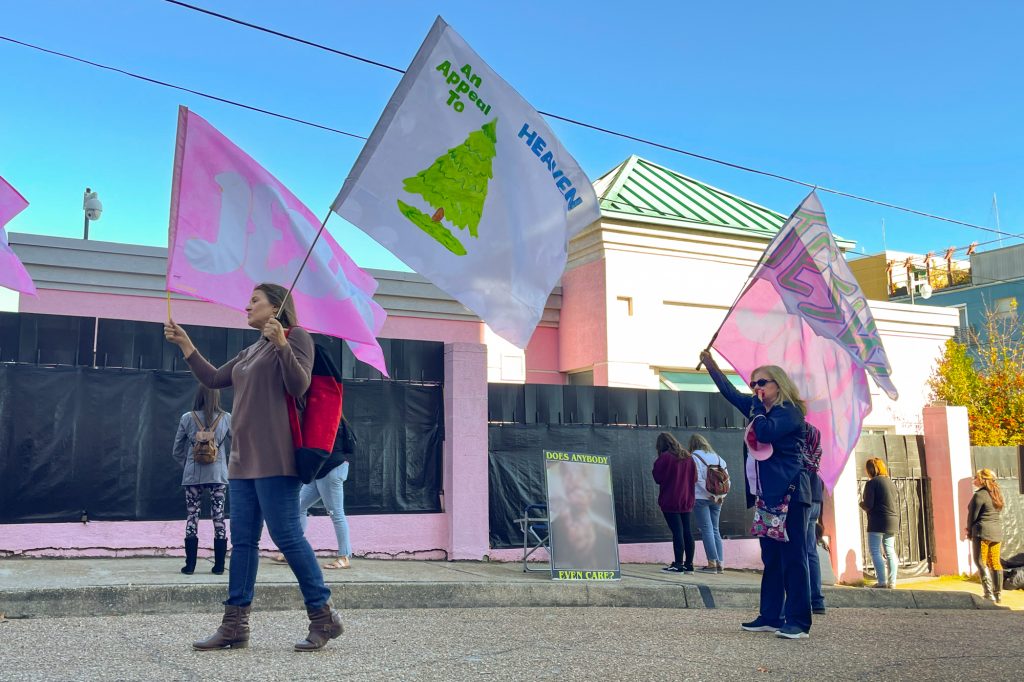
“And that’ll happen automatically, in my opinion, because I am putting pro-life judges on the court,” Trump said. “I will say this: It will go back to the states, and the states will then make a determination.”
After taking office in 2017, Trump began making good on his promise. In 2017, he appointed conservative jurist Neil Gorsuch, who replaced the late anti-abortion Justice Antonio Scalia. But it was Trump’s decision to replace Justice Anthony Kennedy, who once provided the decisive vote to uphold abortion rights in the 1992 Casey case, with Brett Kavanaugh that began shifting the court’s makeup on abortion rights.
Then, when longtime liberal Justice Ruth Bader Ginsburg died of cancer several weeks before the 2020 election, Trump nominated Amy Coney Barrett, who had a history of publicly opposing abortion rights, to replace here. U.S. Senate Republicans, who would retain control of the Senate until January 2021, rushed to confirm her. The appointment solidified a 6-3 right-wing majority on the court.
A Plan to ‘Eradicate Roe’
Even before Trump appointed Kavanaugh or Barrett, though, Americans Defending Freedom, a right-wing evangelical Christian legal organization, hatched a plan to get a case to the nation’s high court in an effort to overturn Roe v. Wade.
“We have a plan to make Roe irrelevant or completely reverse it,” Kevin Theriot, the vice president of the ADF’s Center for Life, told a crowd of anti-abortion activists at the Evangelicals for Life Conference in Washington, D.C., in January 2018.
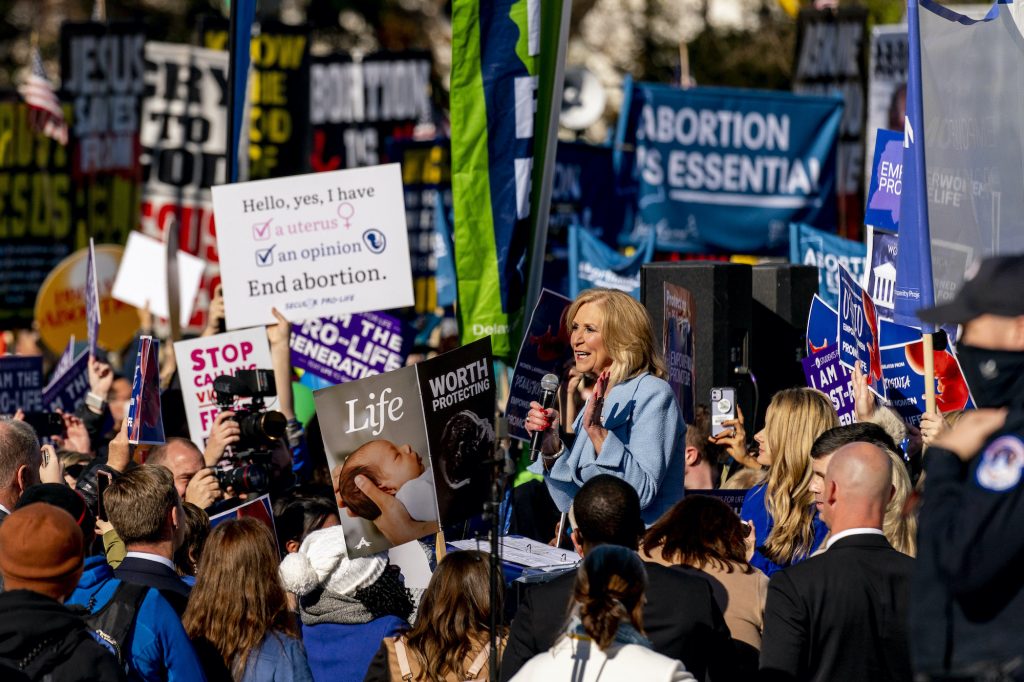
ADF senior counsel Denise Burke explained that the organization’s lawyers had written legislation banning abortion after 15 weeks and given it to Mississippi lawmakers as the opening salvo in their “strategic” and “comprehensive” plan to “eradicate Roe.” The idea, she said at the time, was to force abortion-rights groups to file a lawsuit that would get the core of Roe v. Wade all the way to the U.S. Supreme Court.
Five days before top ADF leaders spoke at the 2018 Evangelicals for Life Conference, three Mississippi Republicans introduced the ADF’s 15-week ban at the Legislature. Less than two months later, then-Gov. Phil Bryant signed it into law. Mississippi’s only abortion clinic, the Jackson Women’s Health Organization, immediately sued. Sen. Joey Fillingane, one of the Republicans who introduced the bill, said in 2019 that the goal of the abortion bills was to start “testing the limits of Roe” in light of the changes Trump had made at the U.S. Supreme Court.
A federal court in Jackson and the 5th U.S. Circuit Court of Appeals in New Orleans both agreed that the 15-week ban violated the Roe and Casey precedents. But in 2020, Mississippi Attorney General Lynn Fitch appealed to the U.S. Supreme Court, which agreed to hear the Dobbs case in May 2021.
In a brief last summer, Fitch asked the U.S. Supreme Court to overturn Roe v. Wade; during hearings in December, a majority of the justices, including Trump’s three appointees, appeared sympathetic to Mississippi’s request. An early draft of the Dobbs opinion leaked in May, revealing that Justice Alito and the conservative majority were prepared to overturn Roe v. Wade.
Republicans Want Federal Abortion Ban
Though the Dobbs ruling allows states to make their own abortion laws, some Republicans are already pushing for a national abortion ban. In 2011, Mississippi residents voted against the Personhood Amendment, a state ballot initiative that would have banned abortions from the moment of fertilization.
But 163 Republican members of Congress, including all three Republican U.S. House representatives from Mississippi and U.S. Sen. Roger Wicker, are currently co-sponsoring a federal “Life at Conception Act” that would similarly ban abortions from the moment of fertilization nationwide.
While federal abortion restrictions are unlikely while Democrats control Congress and the White House, Republicans could change that if they reclaim control in the 2022 and 2024 elections.
Volunteers at Mississippi's only abortion clinic, the Jackson Women's Health Organization, are holding up signs letting patients know the clinic is STILL open and still taking patients.
Anti-abortion preachers are trying to turn them away, screaming, "ROE IS OVERTURNED." #Dobbs pic.twitter.com/hymYg9jIlS
— Ashton Pittman (@ashtonpittman) June 24, 2022
This is a breaking story. It will be updated.


